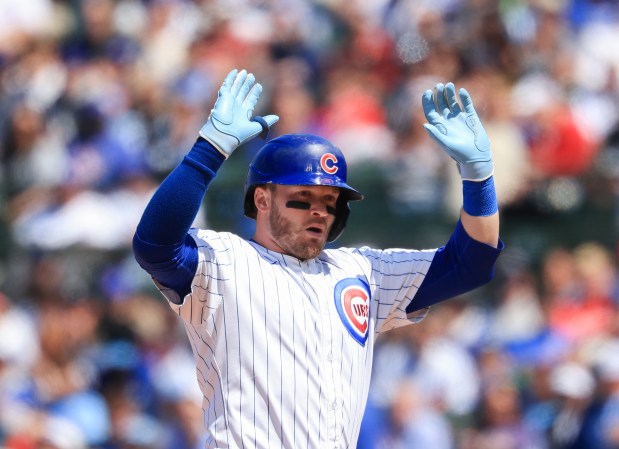The city of Naperville’s annual revenue stream could take a $5 million hit if the state’s 1% sales tax on groceries is eliminated, a move Gov. J.B. Pritzker has proposed as part of his 2024-25 fiscal year spending plan.
Raymond Munch, Naperville’s director of finance, warned of the possible tax repeal’s local impact at this week’s Naperville City Council meeting.
“Staff has begun initial discussions about what eliminating the grocery tax would mean for the city so that we could determine the best path forward,” he told council members. “Early indications are that the elimination of the grocery tax is likely to pass.”
Munch’s comments were made as part of a larger report on the city’s finances through the first quarter of 2024.
The state’s new fiscal year begins July 1, which is the mid-year point for the city’s budget.
Illinois is among 13 states that impose a tax on groceries. Illinois’ 1% grocery rate applies to food that has not been prepared for immediate consumption, prescription medicines and medicinal appliances, such as wheelchairs or hearing aids, according to the Illinois Department of Revenue.
All of the revenue generated from the state’s grocery tax is returned to municipal governments for local use. That’s unlike the state’s 6.25% sales tax rate imposed on general merchandise, of which 20% is returned to municipalities.
Prtizker has framed eliminating the grocery tax in Illinois as an effort to abolish a regressive tax that hits those on the lowest rung of the economic ladder the hardest.
In April, the Institute of Government and Public Affairs at the University of Illinois released a report reviewing an elimination of the state’s grocery tax. The report noted that grocery taxes are a “controversial way to raise revenue” because “low-income households spend a much higher share of their income on food than better-off households.”
Pritzker’s 2025 fiscal year proposal is not the first time cutting the state’s grocery tax has come up.
In 2022, the tax was suspended as part of a $1.8 billion state tax relief package because of the COVID-19 pandemic. While on hiatus, the void was filled from a pool of $400 million in the state’s general revenue fund.
Reimbursement does not seem to be an option this time around, Munch told elected officials Tuesday. Locally, preliminary analysis indicates that elimination of the state’s 1% grocery tax could equate to about $5 million less revenue a year going into Naperville’s coffers.
For a better idea of how that cut measures up against the city’s larger budget, take the city’s general fund for 2024. As part of Naperville’s current fiscal year spending plan, staff projected $157.17 million in general fund revenues. A $5 million slash to that sum is a 3.2% drop.
Munch said it’s hard to say exactly when and to what extent eliminating the grocery tax would play out locally. But for now, as the possible cut looms, he stressed the importance of the city maintaining financial flexibility, which involves being conservative during budget planning so the city can manage any impacts to revenue.
Councilman Josh McBroom, who has been vocal about the proposed tax cut in recent council meetings, said in a call Friday that he views this as an opportunity for the city to take a closer at its budget and “cut out the fat.” Over the past few months, he has raised the potential tax repeal amid council discussions over allotting $115,000 for diversity, equity and inclusion consultant work and spending $423,600 to repair three downtown fountains.
“I just don’t think we can look at this and say we lost money, let’s tax residents to make up for it,” he said.
According to an agenda report prepared ahead of Tuesday’s meeting, city staff are analyzing what alternative revenue sources can be pursued or adjustments made in anticipation of the tax cut going into effect.
However, Munch advised against making any decisions before understanding the full, real-time impact of policy change at the state level. He told council members that “reactions based on incomplete information have unintended consequences.” To that end, staff are encouraging a “wait and see approach,” he said.
In a call Thursday, Munch said that approach worked well during the pandemic.
“One of the things that we were very cautious about was not making decisions too quickly without having the data to support them,” he said.
With exercising caution, he said, the intention was to avoid acting too fast and making cuts that impacted city services only to recover sooner than anticipated. “It’s not always easy to recover from that either,” he said.
In a statement, Naperville Mayor Scott Wehrli said that, “While the elimination of the statewide grocery tax would be impactful for us, we have successfully managed through many tough economic times.
“We will continue to maintain our flexibility and not make any knee jerk reactions,” he said.
Other suburban municipalities have started to weigh the implications of a grocery tax repeal. In early March, mayors from the cities of Algonquin, Barrington, Cary and Libertyville gathered to protest the proposed cut, saying it would hurt their ability to provide basic services.
In Skokie, staff have warned that eliminating the grocery tax would deplete the village’s revenue stream by $1.2 million.
Should the tax cut go into effect in July, staff wouldn’t be able to glean the “true impact” on Naperville’s finances until about mid-2025, Munch said, because they “would want to see several months of data to get some assurances as to what that effect looks like in the long term.”
Chicago Tribune reporters Dan Petrella, Jeremy Gorner, Olivia Olander and Robert McCoppin contributed.



